The Citric Acid Cycle is a Roundabout
2017-11-15
Conceptual goals
- Understand how the pathways we've discussed thus far tie into the rest of metabolism
- Understand that most metabolites can be converted into one another by running through central metabolic pathways and intermediates
Skill goals
- Reason about metabolic energy extraction
- Reason about metabolic pathway regulation

Citric Acid Cycle
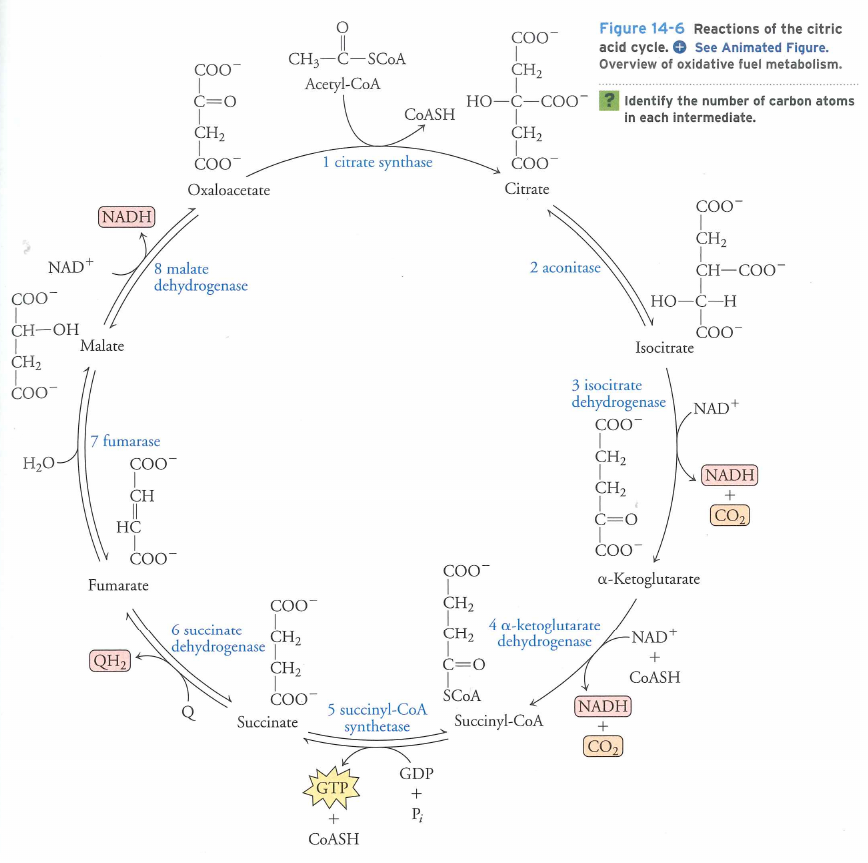
True or False
The citric acid cycle is reduces carbons
False.
So what does it reduce?
$NAD^{+} + H^{-} \rightarrow NADH$ and $Q + H^{+} + H^{-} \rightarrow QH_{2}$
Which allows cells to extract more energy, glycolysis or the citric acid cycle?
The citric acid cycle (yields ~30 ATP/glucose relative to 2 for glycolysis)
Why is its yield so much higher?
It fully oxidizes glucose to $CO_{2}$
Citric acid cyle summary
- It's used for carbon oxidation
- The reduced products it generates ($NADH$ and $QH_{2}$) can be oxidized by oxidative phosphorylation to yield $ATP$
- Provides access to much higher energy yields for glucose than glycolysis...provided there is some "final $e^{-}$ acceptor" around.
- Generates useful intermediates used throughout metabolism
- It's a buffer for metabolites that assures a steady concentration of important precursor molecules
A "roundabout" is a good mental picture of the citric acid cycle
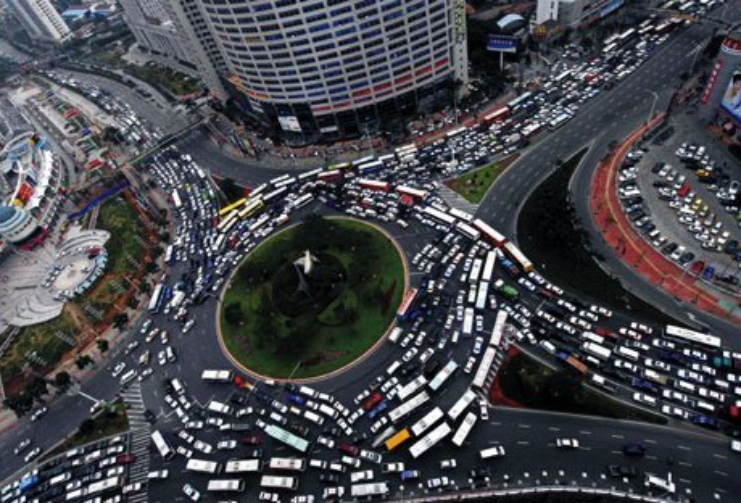
The citric acid cycle acts as a "buffer" for all metabolism
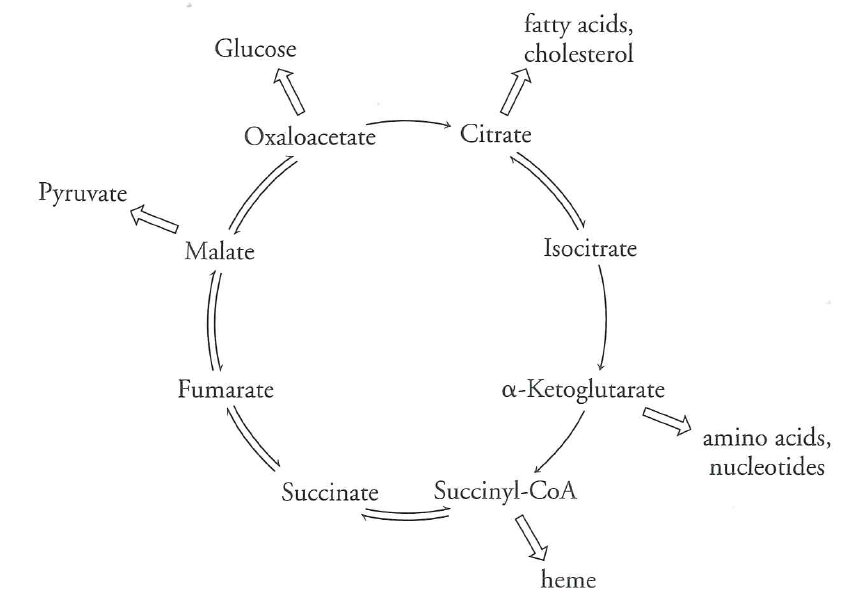
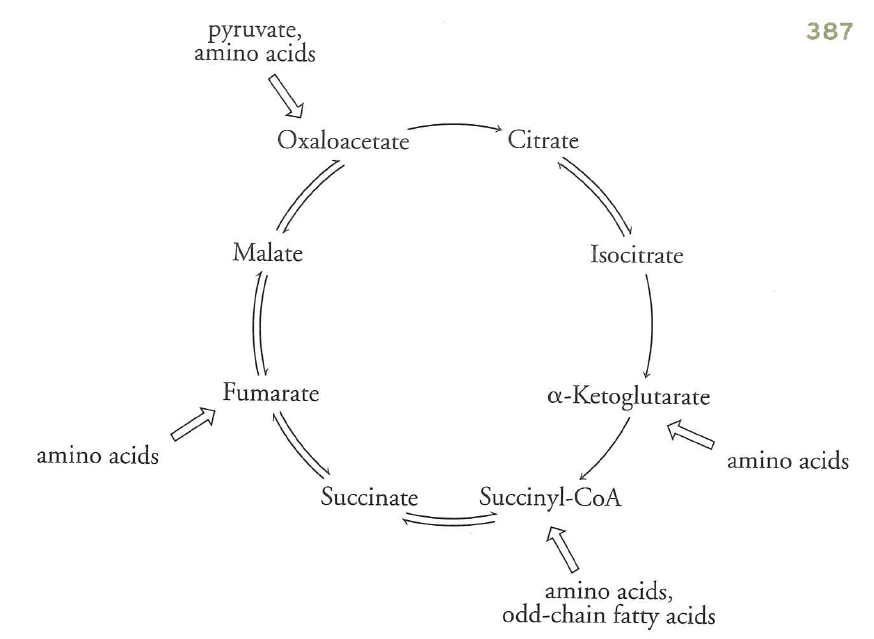
Citric acid cycle is central to all metabolism
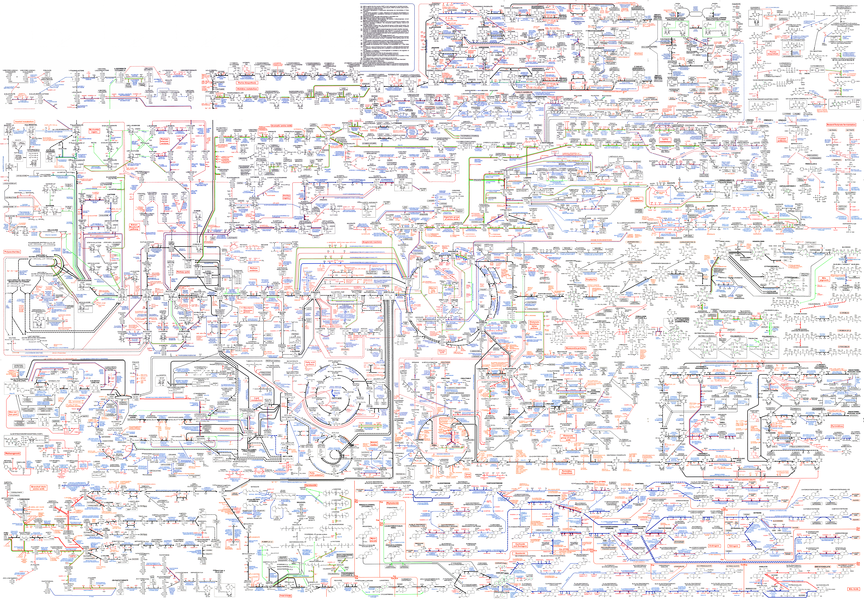
Key points
- The citric acid cycle can "buffer" metabolism by allowing free interchange between a vast number of metabolites
- Metabolism is built on a key set of "core" metabolites (such as pyruvate, acetyl-coA and $\alpha$-ketoglutarate)
- The citric acid cycle changes rates, but never turns off because of its role as a central "roundabout" in metabolism
IMPORTANT: Do not worry about (or get lost in) details that follow. Focus on the key points and how these examples illustrate these points.
Most of our energy comes from three forms of fuel
- Sugar
- Fat
- Protein
Most of our energy comes from three forms of fuel
- Sugar
- Fat
- Protein
Sugar
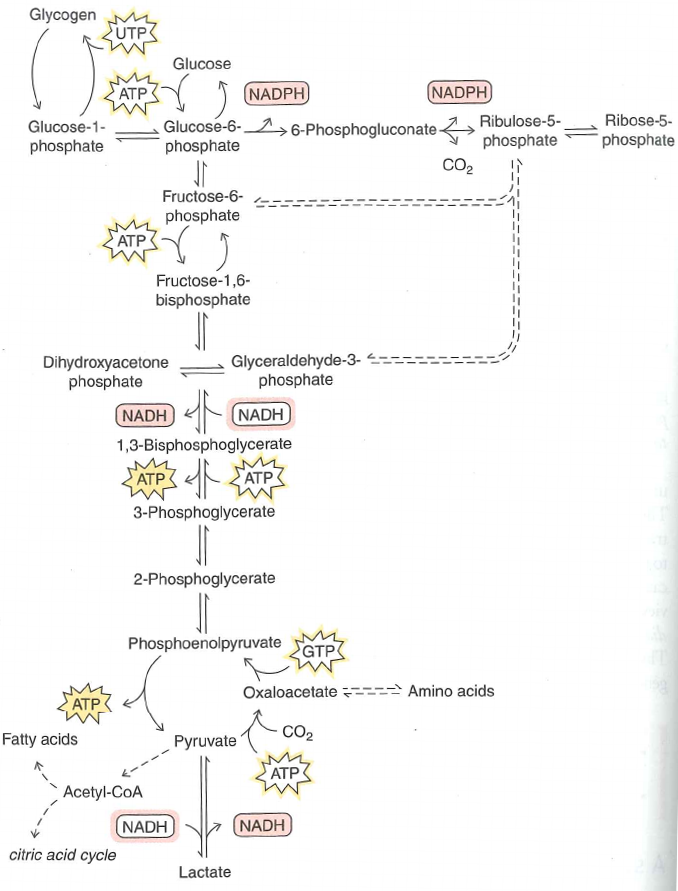
Most of our energy comes from three forms of fuel
- Sugar
- Fat
- Protein
Fat is broken into a glycerol molecule and its acyl chains

Glycerol is converted to dihydroxyacetone phosphate
Sound familiar? It's a glycolysis intermediate
Acyl chains are "activated" using conezyme A
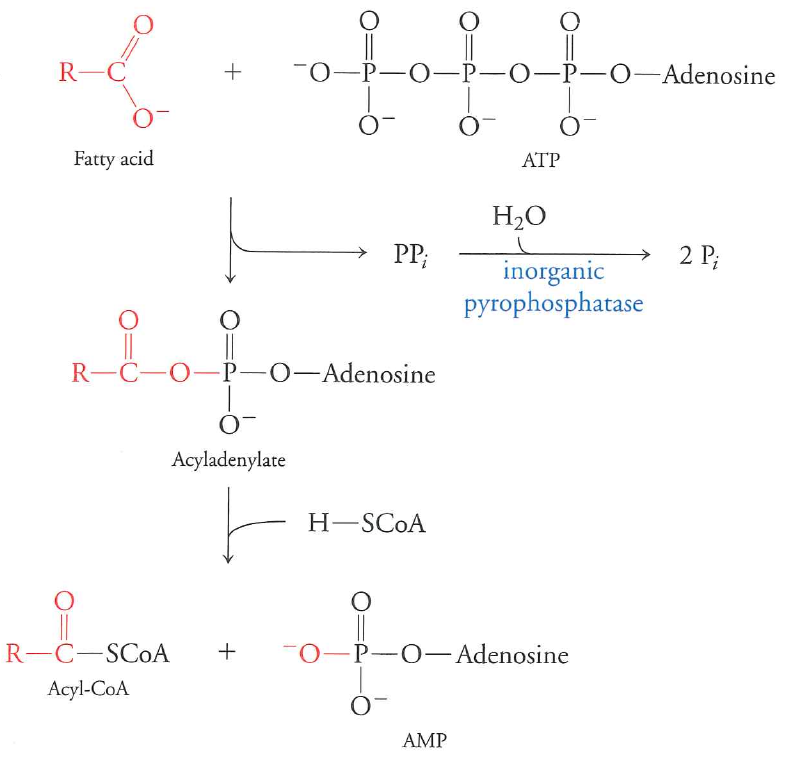
Coenzyme A (coA) acts as a "handle" for cells to move around actetate in both catabolism and anabolism
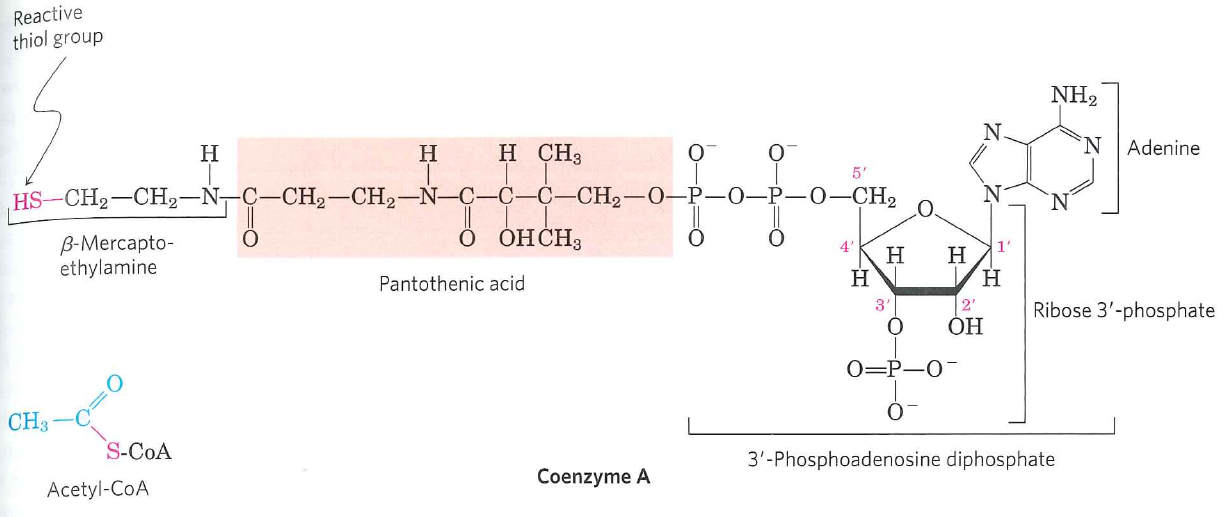
2 carbon units are sequentially chopped off
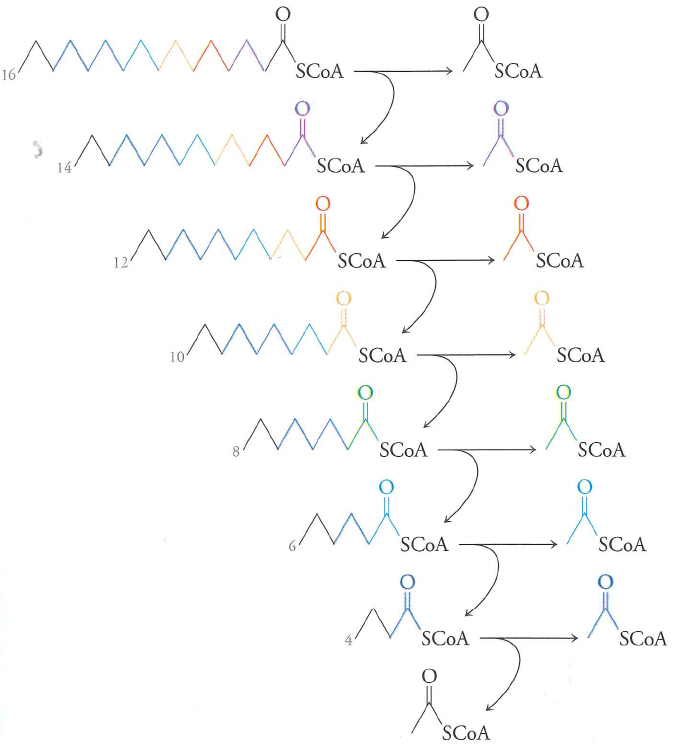
Is the conversion of an acyl chain to acetyl-coA an oxidation or reduction?
Oxidation.
So what other reaction might be coupled to this one?
Each round generates 1 $QH_{2}$ and 1 $NADH$
Fatty acid oxidation produces an acetyl-coA molecule for every two carbons in the acyl chain
What happens to the acetyl-coA?
It enters the citric acid cycle (where it yields 3 $NADH$, 1 $QH_{2}$ and 1 $GTP$)
Fats store a lot of energy
"Typical" triglyceride will have 3 acyl chains of 16 carbons
If you add up reduced $NADH$ and friends you get $\frac {13 \ ATP}{2 \ carbons}$
Total yield is $3 \ chains \times \frac{16\ carbons}{chain} \times \frac{13\ ATP}{2 \ carbons}$
$3 \times 16 \times 13/2 = 312 \ ATP$
Fats have higher $ATP$ yield per carbon than glucose
Fat: $312/48 = 6.5 ATP \cdot carbon^{-1}$
Glucose: $32/6 = 5.3 ATP \cdot carbon^{-1}$
Why is this the case?
Glucose is already oxidized relative to an acyl chain
Gram per gram, fat has twice as much stored energy as sugar
Fats can be synthesized starting from acetyl-coA, just like glucose can be synthesized from pyruvate by gluconeogenesis
Do you think this is a simple reversal of $\beta$-oxidation? Why or why not?
No. Just like gluconeogenesis, irreversible steps must be bypassed.
Big idea:
There are lots of steps in fatty acid oxidation, but those steps all work to convert the material into the same bits that we saw sugar become ($DHAP$, $acetyl-coA$, $NADH$, $QH_{2}$)
Most of our energy comes from three forms of fuel
- Sugar
- Fat
- Protein
How do you think cells deal with the complex structure and chemistry of proteins?
They unfold the protein and chop it up into amino acids with proteases
Free amino acids can be directly recycled to make more proteins
They can also be used for fuel or to make other biomolecules
Many amino acids can be directly converted to things like pyruvate or acetyl-coA
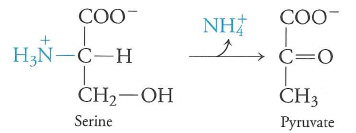
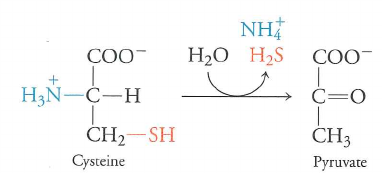

Nitrogens get passed around a lot via transamination
$\alpha$-ketoglutarate can be combined with glutamine to make 2 glutamates

Recognize $\alpha$-ketoglutarate? Citric acid cycle intermediate
Glutamate and pyruvate can be converted to $\alpha$-ketoglutarate and alanine
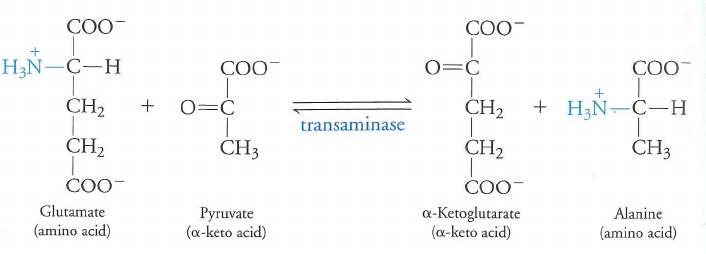
Amino acid catabolism is intimately tied into the citric acid cycle
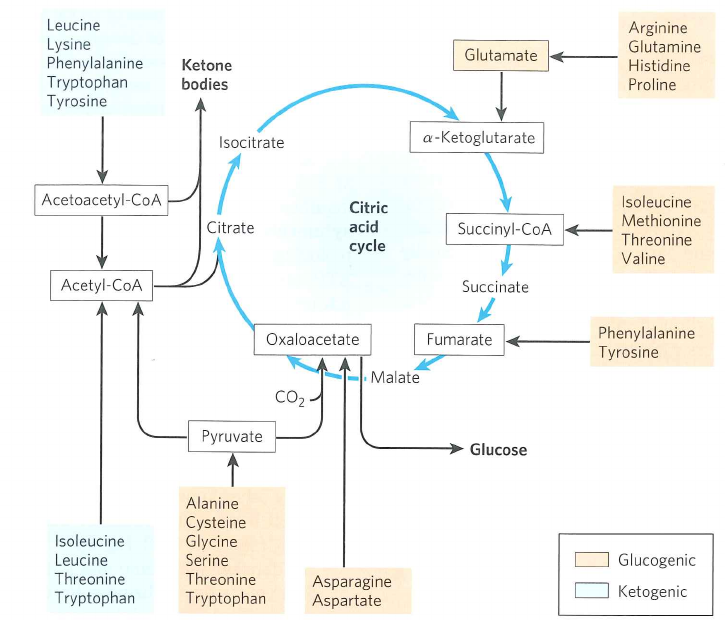
Amino acids are made by many inter-conversions between amino acids and other metabolites...in their own metabolic cycles
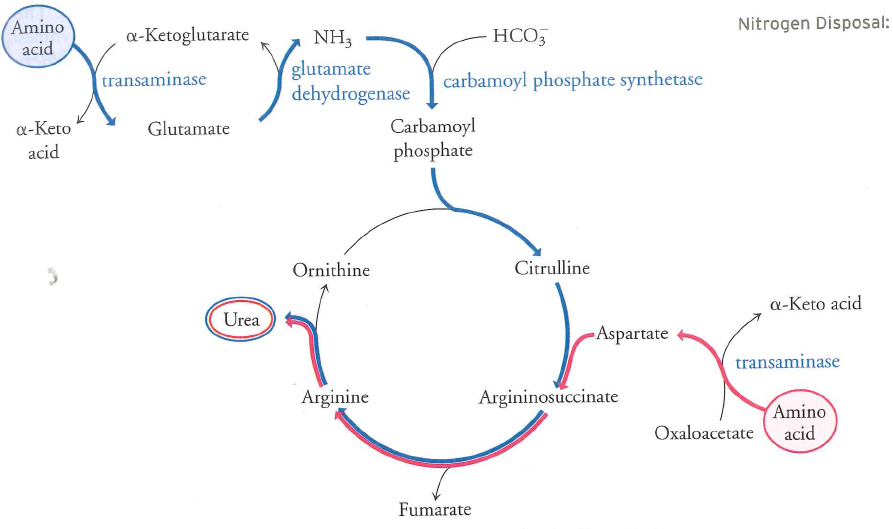
Key point: a dizzying array of molecules are made and processed in cells, but are tied together through several key metabolites.

Summary
- Most metabolism ties directly into the citric acid cycle or glycolysis via a set of "core" metabolites (such as pyruvate, acetyl-coA and $\alpha$-ketoglutarate)
- This allows cells to shift metabolites around to control processes in a coordinated fashion
- The citric acid cycle changes rates, but never turns off because of its role as a central "roundabout" in metabolism